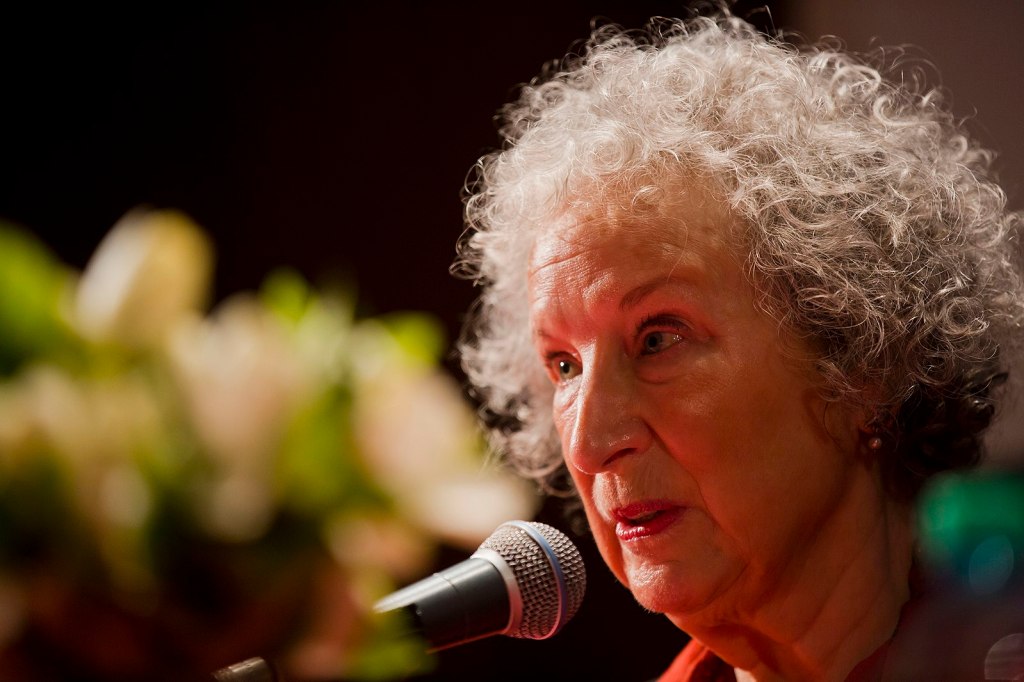Margaret Atwood has won the sixth annual Hitchens Prize, which is awarded every year to a writer who, “in the spirit of the late Christopher Hitchens, demonstrates a commitment to free expression and to the pursuit of truth without regard to personal or professional consequence.” No prize was awarded in 2021. Previous winners include Masha Gessen and George Packer.
In her lecture, which accompanies the award, Atwood remembered her relationship with Hitchens. The two rarely agreed regarding “content, but we were in accord about process,” she says. Facts were what mattered to both, not feelings:
Having feelings was not a thing back then. We would not have admitted to owning such marshmallow-like appendages, and if we did have any feelings, we’d have considered them irrelevant as arguments. Feelings are real — people do have them, I have observed — and they can certainly be plausible explanations for all kinds of behavior. But they are not excuses or justifications. If they were, men who murder their wives because they’re feeling cranky that day would never get convicted.
More:
You can’t exist as a writer for very long without learning that something you write is going to upset someone, sometime, somewhere. Whether you end up with a bullet in your neck will depend on many factors — there are lots of bullets, and some necks are thicker than others — but let us pause to remember that the most important meaning of freedom of expression is not that you can say anything you like without any consequences whatsoever but that the bullet should not be your government’s, and it should not be fired into your neck for an expression of political views that don’t coincide with theirs.
Hitch and I were both of an archaic generation that endorsed the basic principles of logic. We knew an ad hominem when we fell over one. We didn’t consider the factual truth of any given matter to be dispensable—or worse, to be some scoundrelly piece of propaganda cooked up by the opposing party. We both believed in a healthy society’s need for public debate, with testable evidence presented.
Atwood goes on argue that the “moderate center” is the “place to live”:
There’s more respect for the individual, or that is the idea. There’s at least some desire for human rights for everyone, or that, too, is the idea. There’s less fear, and that is the idea as well. But the moderate center is also the hardest position to defend. It lacks a Big Slogan. It lacks hordes of robotic followers. It’s untidy. It resists the homogeneous. And it’s under constant attack from both extremes, those on the so-called right and the so-called left.
Perhaps. Yet, the moderate center is often not in the center. The terms for being a so-called moderate are made by the left. Take the issue of the “climate crisis,” as Atwood calls it, which she understands to be “the most important issue facing us today.” If you take issue with this statement — that we are in a “climate crisis” — you are usually labeled an extremist, even though there is nothing necessarily extreme about this attitude. The same tends to be true about other issues — abortion, gay marriage, the legality of pornography.
It is worth remembering that the Atlantic, which, along with the Dennis and Victoria Ross Foundation, supports the Hitchens Award, fired Kevin Williamson before he wrote a single piece for the magazine because he held the view that abortion was murder and should be considered a capital offense. That Williamson remarked that hanging was the punishment that fit the crime was ghoulish, but it is likely that even if he didn’t suggest this and made other exceptions to his view, he would have been fired anyway.
In other news
Ivan Turgenev was a somewhat pathetic, sometimes difficult, person but a great novelist:
He was the son of a tyrant. His mother, Varvara Petrovna Lutovinova, was the owner and ruler of some five thousand serfs, whom she made the punchbags for a lifetime of disappointment (she had been abused by her stepfather; Turgenev’s father had married her for her money and then neglected her before his premature death). She ordered floggings, denied or demanded marriages, separated families, provoked women to infanticide and sent people to Siberia. Turgenev spent his childhood in terror of her, and of her power over his life and the lives of others. He was aware of the irony in the fact that he was first seduced by a family serf… In his adult life, this inverted power dynamic repeated itself. Turgenev was passionate — some thought insane — in his subjection to the great opera singer Pauline Viardot, to whom he was attached for forty years. Eventually, after periods of considerable unhappiness, he lived in a mostly comfortable ménage with her and her husband, Louis, and their children (his daughter, whom he named Paulinette, was also enrolled in the family). He followed them doggishly around Europe; in one house, visitors were surprised to find him lodged in the attic. Unlike his mother, Turgenev did not make a fetish of personal dignity. In 1882, he visited the Tolstoys and, at sixty-three, performed the can-can for the children. “Turgenev — the can-can. Sad,” Tolstoy wrote in his diary.
Nature does not care: “Too many nature writers descend into poetic self-absorption instead of the sharp-eyed realism the natural world deserves.”
What happened to robust, even rude, literary criticism, Rosemary Jenkinson wonders?
Revisiting Aldous Huxley’s Crome Yellow:
Huxley was twenty-six, with several poetry collections and a book of short stories under his belt, when he decided it was high time he published a novel. To that end he left London, where he was obliged to toil at journalism to scrape together a living, and decamped to Italy with Maria and their baby son, Matthew. Over the summer of 1921, Huxley composed Crome Yellow in Forte di Marmi, a seaside town in northern Tuscany. It was the coast, he told the Paris Review, “where Shelley was washed up, under the mountains of Carrara, where the marble comes from. It was an incredibly beautiful place then.” He conceived Crome Yellow as a pithy entertainment in the tradition of Thomas Love Peacock, a friend of Shelley’s who wrote popular satirical novellas, often set in country houses. “I lack the courage and the patience,” Huxley confessed to H.L. Mencken, “to sit down and turn out eighty thousand words of Realismus. Life seems too short for that”… Though Huxley wrote eleven more novels, most famously the dystopian masterpiece Brave New World, and published many short-story and essay collections, Crome Yellow is widely regarded as his most lightheartedly enjoyable work… Those who saw themselves in Crome Yellow were understandably less delighted by it. Carrington described it as “a book which makes one feel very very ill.”
A misunderstood Iranian modernist: Sadeq Hedayat “is a legend,” Amir-Hussein Radjy writes in the New York Times, “but he is still misunderstood. A story that is told by a bedridden man drifting between hallucinations and toward his own death, The Blind Owl (1936) has been given vastly different readings over the decades — as an allegory of political repression in Iran, or as a personal testimonial of Hedayat’s depression.”

























